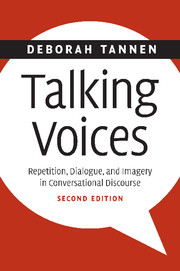Book contents
- Frontmatter
- Contents
- Acknowledgments
- 1 Introduction to first edition
- Introduction to second edition
- 2 Involvement in discourse
- 3 Repetition in conversation: toward a poetics of talk
- 4 “Oh talking voice that is so sweet”: constructing dialogue in conversation
- 5 Imagining worlds: imagery and detail in conversation and other genres
- 6 Involvement strategies in consort: literary nonfiction and political oratory
- 7 Afterword: toward a humanistic linguistics
- Appendix I: Sources of examples
- Appendix II: Transcription conventions
- Notes
- List of references
- Author index
- Subject index
7 - Afterword: toward a humanistic linguistics
Published online by Cambridge University Press: 23 December 2009
- Frontmatter
- Contents
- Acknowledgments
- 1 Introduction to first edition
- Introduction to second edition
- 2 Involvement in discourse
- 3 Repetition in conversation: toward a poetics of talk
- 4 “Oh talking voice that is so sweet”: constructing dialogue in conversation
- 5 Imagining worlds: imagery and detail in conversation and other genres
- 6 Involvement strategies in consort: literary nonfiction and political oratory
- 7 Afterword: toward a humanistic linguistics
- Appendix I: Sources of examples
- Appendix II: Transcription conventions
- Notes
- List of references
- Author index
- Subject index
Summary
In 1985 I directed a summer Institute entitled “Humanistic approaches to linguistic analysis,” with support from the National Endowment for the Humanities. In a lecture delivered at that Institute, Becker (1988:31) explains,
The problem many of us have with science is that it does not touch the personal and particular…. By adopting scientific constraints on the statements we make, we move away from the very thing we want to study. This seems to me to be one of the major points of Wittgenstein's Philosophical Investigations.
This accurately reflects the kinds of constraints most see as required by science, but there is no reason that scientific, in the sense of rigorous, disciplined, and systematic, investigation must exclude the personal and the particular. Just as the scientific study of whales or elephants or chimpanzees must include painstaking observation and description of particular, individual creatures interacting with each other in their natural environments, so the scientific study of language must include the close analysis of particular instances of discourse as they naturally occur in human and linguistic context.
A similar perspective is expressed by Sacks (1987:41), who shows that modern medicine, in contrast with earlier naturalistic medical studies, has resulted in “a real gain of knowledge coupled with a real loss in general understanding.” Pleading for a reintegration of what has been split into a “soulless neurology” and a “bodiless psychiatry,” Sacks calls for a “personal or Proustian physiology,” a “personalistic neurology” (1986:3).
- Type
- Chapter
- Information
- Talking VoicesRepetition, Dialogue, and Imagery in Conversational Discourse, pp. 187 - 188Publisher: Cambridge University PressPrint publication year: 2007



